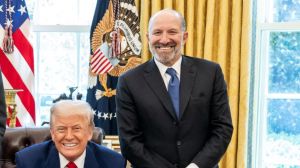Stay updated with the latest - Click here to follow us on Instagram
‘If they charge us, we charge them’: Trump announces sweeping reciprocal tariffs
The tariffs Trump enacted through an executive action on Thursday won’t take effect immediately, a White House official said as cited by CNN, allowing time for potential trade negotiations with other nations.
 Trump threatened to impose new US duties on goods from many more countries next week. (AP)
Trump threatened to impose new US duties on goods from many more countries next week. (AP)Hours ahead of meeting with PM Modi, US President Donald Trump doubled down on his extraordinary push for more balanced trade, announcing on Thursday a round of new, sweeping reciprocal tariffs hitting both allies and competitors.
“Very simply, it’s if they charge us, we charge them,” Trump said Sunday, explaining why he intended to enact reciprocal tariffs.
“On trade, I have decided that for the purpose of fairness, I’ll charge reciprocal tariffs – meaning, whatever countries charge the United States of America, we will charge them – no more, no less. They charge us with tax and tariffs, it’s very simple we will charge them with exact tax and tariffs,” US President said, as reported by Reuters.
Trump signed a memorandum on Thursday directing the development of a plan to address “longstanding imbalances” in global trade, but no new specific tariffs were introduced.
“India has more tariffs than nearly any other country,” he added.
The tariffs Trump enacted through an executive action won’t take effect immediately, a White House official said as cited by CNN, allowing time for potential trade negotiations with other nations.
The move is part of Trump’s broader strategy to pressure allies and rivals alike into making economic concessions. The White House press notice stated that the administration aims to “put the American worker first, improve competitiveness, reduce the trade deficit, and bolster economic and national security.”
US officials highlighted tariff disparities, pointing to the EU’s 10% duty on cars compared to the US’s 2.5%, India’s 100% tariff on US motorcycles versus the US’s 2.4%, and Brazil’s 18% duty on US ethanol against America’s 2.5%.
While Trump has aggressively promoted tariffs, many have been delayed or scrapped. Duties on Colombia were withdrawn after it accepted deported migrants, and tariffs on Canada and Mexico have been repeatedly postponed. The only significant tariff action since his return to office is a 10% duty on Chinese goods, though parts of it, including the removal of duty-free status on low-cost packages, have been delayed.
Trump’s focus on tariffs has sparked concerns among economists, who warn they could worsen inflation rather than lower prices as promised. Inflation stood at 3% in January as Trump took office, and recent data suggests price pressures remain persistent.
Reciprocal tariffs were a key campaign promise for Trump, aimed at countering foreign taxes on American goods and addressing what he views as unfair trade practices.
Photos




- 01
- 02
- 03
- 04
- 05


























